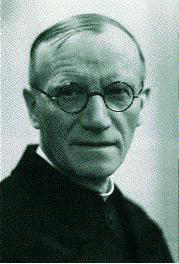Emile Neubert: Analysis of Principal Works
Emile Neubert: Analysis of Principal Works
Appreciating Father Emile Neubert, S.M.
- Father Luigi Gambero, S.M., translated from French into English by Father Joseph Stefanelli, S.M.

Who was Emile Neubert? A French Marianist priest, small of stature, fragile of health, modest and humble. When he was a student of theology preparing for the priesthood, a doctor told his superiors that he might not be able to continue his studies because of his general physical condition. However, he lived a long life and became the most respected and most famous Marian theologian of the Society of Mary founded by the Blessed William Joseph Chaminade.
Known throughout the world through his writings, Emile Neubert may be considered as one of the agents of the Mariology which is today noted for its rigorous and scientific character. Yet, it is not beyond the comprehension of simple believers. It is now forty years since his death (1967), yet his features and his work remain alive in the memory of his Marianist brothers. For it was he who, by his life and by his activity as a theologian, as writer and as educator, interpreted faithfully the Marian spirituality of Blessed William Joseph Chaminade and spread it far beyond the institutions and associations which the latter had founded.
Neubert’s name leads us almost instinctively to think of the Mother of the Lord. It can be said that, in his numerous publications, all is expressed in a Marian key. Cardinal Richaud said of him that he possessed a true charism for speaking about the Blessed Virgin. Cardinal Suenens spoke of him “as a pioneer of Marian theology presented at the level of all and inserted into practical living.” That is how Emile Neubert was, and that is how we like to remember him when reading his works of Marian doctrine and spirituality. They continue to arouse enthusiasm and consensus.
Now we have the good fortune to have within our hands a publication, scholarly and profound, of his thought. Jean-Louis Barré, SM, in his doctoral thesis, La Mission de la Vierge Marie d’apres les Ecrits d’Emile Neubert (1878-1967), presents us with a study which takes us through all of Neubert’s works and which helps us to recapture the principal and clearest lines of his Marian theology. [The book was printed in Belgium by Trinacria, 334 pages.]
Barré’s work, in a way, takes us on the long journey Neubert traveled in order to achieve his full maturity as a theologian and master of the spiritual life. It was already apparent in the autobiography which is given appropriate consideration at the very beginning of the thesis.
Fundamental also are the clarifications of the theological and cultural context in which Neubert’s vocation for the study of Mariology was nurtured. He well understood that engaging in a deep study of the historical sources of Christianity was not superfluous since many of those sources required further research and stricter verification. Neubert began this engagement in historical investigation in his dissertation for his doctorate, Marie dans l’Eglise anténicéenne. Fortunately, Barré, in his second chapter, passes in review the authors and the currents of thought which might have directly or indirectly influenced Neubert’s cultural and Marian formation.
Chapter three, on the track of Marie dans le dogme, devoted itself to a properly dogmatic theology concerning the Mother of God, as elaborated by Neubert. It does so with abundant presentation and a rich investigation. Chapter four deals with the slender volume Mon Idéal: Jésus, Fils de Marie. It is truly a masterpiece of Marian spirituality showing how Neubert offers the believer, in the person of the Mother of God, a precious and enthusiastic guide for walking safely along the path to Christian holiness.
In conclusion, Barré, in chapter five, presents an overview of the reception which, even today, is given to Neubert’s writings and of the spiritual fruits which they produce not only among the spiritual descendants of Blessed William Joseph Chaminade but in the entire Church. Its proof, among others, is the translations into many languages in which Neubert’s works have been published.
Barré’s work bears the best letters of credibility for obtaining a welcome from the Marianist religious, from specialists in Mariology, and from the faithful who reserve a special place for the Blessed Virgin in their journey toward the fullness of the Christian life, who is Jesus, Son of Mary.
All About Mary includes a variety of content, much of which reflects the expertise, interpretations and opinions of the individual authors and not necessarily of the Marian Library or the University of Dayton. Please share feedback or suggestions with marianlibrary@udayton.edu.
